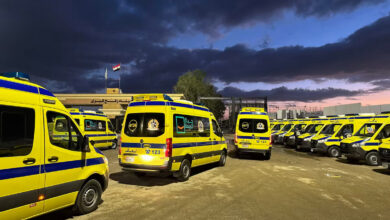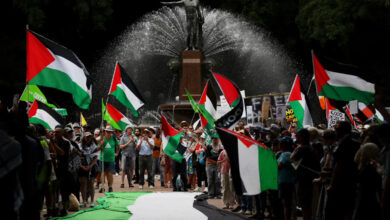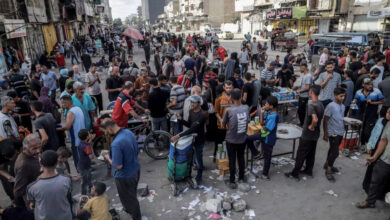Arish–Egyptian security forces put down a protest staged by international activists from the Viva Palestina convoy in the Mediterranean port of el-Arish late on Tuesday night. More than 20 members of the convoy and at least ten riot police were injured in the clashes. Six convoy members were reported missing and are assumed to have been arrested.
The Gaza-bound convoy, consisting of some 200 vehicles, had been shipped to Arish on Monday 4 January via the Syrian Port of Latakia. Last week Egyptian authorities demanded that the convoy be rerouted to Arish–from its planned course via Aqaba in Jordan to the Red Sea Port of Nuweiba. However, since their arrival the Viva Palestina convoy has been deadlocked in negotiations with Egyptian authorities, who opened the Rafah border crossing in Gaza from 3 until 6 January.
Commencing its journey from the UK and Turkey, the Viva Palestina convoy comprises some 200 ambulances, vans and trucks loaded with humanitarian aid. On Tuesday afternoon Egyptian authorities welcomed and received Viva Palestina’s chief delegates–including British MP George Galloway and several Turkish MPs–but raised objections regarding 59 of the vehicles in their convoy, deeming them non-essential. According to Egyptian authorities these 59 vehicles could enter Gaza, but at a later point in time, through the el-Auja border crossing with Israel.
Viva Palestina delegates rejected the terms imposed on them. At the port Galloway announced “They instructed us to hand over 59 of our vehicles to Israel at their checkpoint, where they would never be seen again. This is 25 percent of a convoy which drove thousands of miles and for which people worked very hard. This is in direct contradiction to the written agreement which we made with the government of Egypt through the Egyptian consulate in Aqaba.”
Convoy members–520 of them, from 17 countries–began protesting at the port and chanting slogans in support of Gaza, along with others against the Egyptian regime. Shortly afterward a group of angry youth activists pushed and pulled on a port gate until they broke it open. Security forces were swift to mobilize rows of riot police, armored personnel carriers, firetrucks and lorries to block the exit and prevent the convoy from leaving.
Outside the port a junior state security officer in civilian clothes informally asked three journalists from Al-Masry Al-Youm, “Are you going to write that they broke down the gates to the port? That they beat up one of our conscripts? That they are burning tires inside? Are you going to write about all of this?” The officer concluded: “We’re going to clean this mess up in a little, you’ll see.”
An angry Arabic-speaking Turkish youth activist sitting on top of a port wall said, “Yes, we broke down the gates, but they were rusty gates anyway.” He denied that fellow activists had beaten a conscript and insisted that they weren’t burning tires inside. Moments later, however, the thick smoke of burning tires could be seen billowing from within.
An assortment of riot police and plain-clothed officers with clubs moved into action just before midnight. Rocks were being hurled back and forth amidst shouts, screams and curses, and the sound of breaking windows and windshields. The firetrucks opened their water canons. The clashes lasted less than 15 minutes. The protesters withdrew into the port, and security forces took a few steps back. Inside the port a group of activists announced that three Britons, two Americans, and one Kuwaiti had been arrested.
An elderly (unnamed) English activist told Al-Masry Al-Youm, “We didn’t want any clashes. Well I can’t speak for everybody in the convoy, since some lads are keener on confrontation. We just want to deliver the medicine and aid that we collected back home.” He added, “We drove 3000 miles to Aqaba and then back through Syria. Now we’re just 25 miles short of our destination, we want to get this convoy through.”
Addressing convoy members from on top of a Turkish car, Galloway said, “We bent over backwards to cooperate with these people, they asked us to come to el-Arish, they told us that we would be welcome in el-Arish, and now we know what they mean by ‘welcome’.”
He added, “We had a solemn and binding agreement signed by both parties, through which we agreed to withdraw from Aqaba. It came at a huge expense of money, energy, time and health. This means that the agreements of the Egyptian dictatorship cannot be trusted even when they are signed on paper.”




